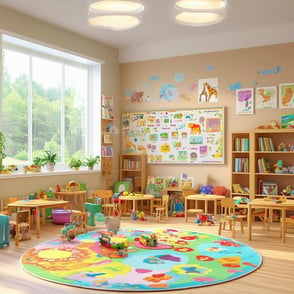Unraveling the Mind of a Child: The Legacy of Jean Piaget
In the ever-evolving field of educational psychology, few names resonate as profoundly as that of Jean Piaget. His groundbreaking work on cognitive development in children has left an indelible mark on how we understand learning processes. Though he was a Swiss psychologist, his influence is felt globally, transcending borders and impacting educational frameworks worldwide. This blog explores Piaget's fascinating journey, his key research contributions, and the lasting legacy of his theories in educational psychology.
But before you go on, take a look at our blogs on other early years educators and thinkers from across the US and Europe...
The Early Days: A Naturalist in the Making
Born on August 9, 1896, in Neuchâtel, Switzerland, Jean Piaget was a child prodigy with an early interest in biology and natural sciences. By the age of 11, he had already published his first scientific paper on an albino sparrow, showcasing his burgeoning curiosity and analytical prowess. His father, a professor of medieval literature, instilled in him a love for scholarship, while his mother nurtured his interest in religion and philosophy, creating a fertile ground for the development of a keen and inquisitive mind.
Piaget attended the University of Neuchâtel, where he earned a degree in natural sciences in 1918, and later a Ph.D. for his work on mollusks. It was during his postdoctoral studies in psychology and philosophy at the University of Zurich that Piaget encountered the works of Carl Jung and Sigmund Freud, which sparked his interest in psychoanalysis and the mysteries of the human mind.
Pioneering Research in Cognitive Development
Piaget’s journey into the realm of cognitive development began when he moved to Paris and took a position at the Binet Institute, working on standardised intelligence tests for children. It was here that he observed a curious phenomenon: children of the same age often made similar errors in logic and reasoning. Intrigued, Piaget embarked on a quest to explore the cognitive processes underlying these patterns.
His revolutionary theory, known as the Theory of Cognitive Development, proposed that children move through four distinct stages of cognitive growth:
- Sensorimotor Stage (0-2 years): In this stage, infants acquire knowledge through sensory experiences and manipulation of objects (see our blog on the importance of sensory play for children)
- Pre-operational Stage (2-7 years): Children begin to engage in symbolic play and learn to manipulate symbols, but they do not yet understand concrete logic
- Concrete Operational Stage (7-11 years): At this stage, children start to think logically about concrete events and understand the concept of conservation.
- Formal Operational Stage (12 years and up): Adolescents develop the ability to think abstractly and reason about hypothetical problems.
These stages highlighted the active role children play in the learning process, challenging the prevailing view of children as passive recipients of knowledge. Piaget posited that children construct their own understanding of the world through interactions with their environment, a concept that became a cornerstone of constructivist theory.
Mainstream Influence on Educational Psychology
By the mid-20th century, Piaget's theories had gained traction in the field of educational psychology, particularly in Europe and the United States. Educators began to recognise the importance of developmental stages in designing curriculum and teaching strategies. His work underscored the need for education systems to adapt to the cognitive capabilities of children at different ages, leading to more age-appropriate and student-centered pedagogies.
In contrast to behaviourist theories, which focused on observable behaviours and external stimuli, Piaget emphasised the internal cognitive processes of the learner. This shift influenced educational practices worldwide, encouraging educators to consider the developmental readiness of students when introducing new concepts. This is why Hatching Dragons educational ethos and curriculum is broken down into 3 distinct phases: Baby Dragons, in which we focus primarily on sensorimotor development with our babies in line with both Froebelian and Piaget principles; Blue Dragons for our toddlers, in which their sense of awareness of their immediate community can extend beyond their immediate family and key workers to the wider neighbourhood of our school; and preschool for our kindergarten class, in which we can expand their knowledge to different cultures and communities around the world
See how we've incorporated some of the principles of cognitive development into all of our beautiful settings across London
Piaget vs. His Contemporaries
While Piaget's theories were highly influential, they were not without critique or competition. In the United States, psychologist Lev Vygotsky offered a different perspective on cognitive development, emphasising the social and cultural contexts of learning. Vygotsky introduced the concept of the Zone of Proximal Development (ZPD), suggesting that learning occurs in the space between what a learner can do independently and what they can achieve with guidance. This idea differed from Piaget’s more individualistic approach, presenting a complementary view that has enriched educational psychology.
In the UK, educational psychologist Jerome Bruner extended Piaget’s work by emphasising the role of discovery learning and the importance of scaffolding in education. Bruner believed that any subject could be taught to any child at any developmental stage if the material is structured appropriately, a notion that diverged from Piaget’s stage-specific approach.
Across Europe, Piaget’s influence was profound, yet he faced intellectual competition from figures like Maria Montessori, an Italian physician and educator whose child-centered educational approach shared similarities with Piaget's theories but emphasised the child’s autonomy more explicitly.
Lasting Impact and Contemporary Relevance
Though Piaget passed away in 1980, his theories continue to influence contemporary educational practices and research. The constructivist approach he championed is alive and well in classrooms, urging educators to create learning environments that encourage exploration, questioning, and problem-solving. His insights into developmental readiness have informed policies and practices that seek to tailor education to the cognitive stages of learners, ensuring that children are neither overwhelmed nor under-challenged.
However, modern educational psychology has expanded beyond Piaget’s foundational work, integrating insights from neuroscience, technology, and cross-cultural studies. For instance, today’s educators often incorporate technology to create interactive and personalized learning experiences that align with Piagetian principles of active learning. Moreover, the increasing recognition of diverse cultural contexts in learning processes echoes Vygotsky’s social constructivist ideas, broadening the scope of Piaget’s theories.
Conclusion: The Enduring Legacy of a Pioneering Thinker
Jean Piaget’s exploration of cognitive development has left a profound legacy in the field of educational psychology. His insistence on understanding the mental processes of children transformed educational practices, moving them toward more child-centered approaches. While his theories have been expanded and refined by subsequent scholars, the fundamental belief in the child as an active participant in their own learning journey remains a central tenet of effective educational practice.
In comparing Piaget with his contemporaries, it becomes clear that the richness of educational psychology lies in its diversity of perspectives. From Piaget’s cognitive stages to Vygotsky’s socio-cultural approach, these theories collectively enhance our understanding of how children learn and develop.
As education continues to evolve in response to new challenges and opportunities, the pioneering ideas of Jean Piaget will undoubtedly remain a guiding force, inspiring educators to cultivate environments where curiosity thrives, learning is dynamic, and every child is empowered to reach their full potential.

01-Jan-2025 17:34:28
Related Articles








Write a Comment